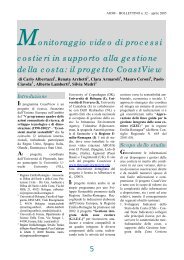The 21st Century climate challenge
The 21st Century climate challenge
The 21st Century climate challenge
You also want an ePaper? Increase the reach of your titles
YUMPU automatically turns print PDFs into web optimized ePapers that Google loves.
Special contributionNational action to meet a global <strong>challenge</strong>Climate change is the defi ning <strong>challenge</strong> facing political leadersacross the world today. Future generations will judge us on howwe respond to that <strong>challenge</strong>. <strong>The</strong>re are no easy solutions—andno blueprints. But I believe that we can win the battle against<strong>climate</strong> change by acting nationally and working togetherglobally.If we are to succeed in tackling <strong>climate</strong> change we have to startby setting out the ground rules. Any international strategy has to bebuilt on the foundations of fairness, social justice and equity. <strong>The</strong>seare not abstract ideas. <strong>The</strong>y are guides to action.<strong>The</strong> Human Development Report 2007/2008 should be mandatoryreading for all governments, especially those in the world’srichest nations. It reminds us that historic responsibility for therapid build-up of greenhouse gases in the Earth’s atmosphererests not with the world’s poor, but with the developed world. Itis people in the richest countries that leave the deepest footprint.<strong>The</strong> average Brazilian has a CO 2footprint of 1.8 tonnes a yearcompared with an average for developed countries of 13.2 tonnesa year. As the Report reminds us, if every person in the developingworld left the same carbon footprint as the average North Americanwe would need the atmospheres of nine planets to deal with theconsequences.We only have one planet—and we need a one-planet solutionfor <strong>climate</strong> change. That solution cannot come at the expense of theworld’s poorest countries and poorest people, many of whom donot have so much as a light in their home. Developed countries haveto demonstrate that they are serious by cutting their emissions.After all, they have the fi nancial and the technological resourcesneeded to act.Every country faces different <strong>challenge</strong>s, but I believe the experienceof Brazil is instructive. One of the reasons that Brazil has sucha low per capita footprint is that we have developed our renewableenergy resources and now have one of the world’s cleanest energysystems. Hydro-power accounts for 92 percent of our electricitygeneration, for example. <strong>The</strong> upshot is that Brazil not only has alighter carbon footprint than rich nations, but that we generate lessthan half as much CO 2for every dollar in wealth that we generate.Put differently, we have lowered our emissions by reducing thecarbon intensity and the energy intensity of our economy.<strong>The</strong> transport sector provides a striking example of how cleanenergy policies can generate national and global benefits. Brazil’sexperience with the development of ethanol from sugar cane asa motor fuel goes back to the 1970s. Today, ethanol-based fuelsreduce our overall emissions by about 25.8 million tonnes of CO 2eevery year. Contrary to the claims made by some commentatorslacking familiarity with Brazilian geography, the sugar productionthat sustains our ethanol industry is concentrated in São Paulo, farfrom the Amazon region.Today, we are expanding our ethanol programme. In 2004, welaunched the National Program of Biodiesel Production and Use(PNPB). <strong>The</strong> aim is to raise the share of biodiesel in every litre ofdiesel sold in Brazil to 5 percent by 2013. At the same time, PNPBhas introduced fiscal incentives and subsidies aimed at expandingmarket opportunities for biofuel production for small family farmsin the North and the North-East region.Brazil’s experience with biofuels can help to support thedevelopment of win–win scenarios for energy security and <strong>climate</strong>change mitigation. Oil dominates the transport fuels sector. However,concerns over high prices, reserve levels, and security ofsupply are prompting many countries—rich and poor—to developpolicies for reducing oil-dependency. Those policies are good forenergy efficiency and good for <strong>climate</strong> change.As a developing country Brazil can play an important role insupporting the transition to low-carbon energy. South–Southcooperation has a vital role to play—and Brazil is already supportingthe efforts of developing countries to identify viable alternativeenergy sources. However, we should not downplay the potentialfor international trade. North America and the European Union areboth scaling-up heavily subsidized biofuel programmes. Measuredagainst Brazil’s ethanol programme these score badly both interms of costs and in terms of efficiency in cutting CO 2emissions.Lowering import barriers against Brazilian ethanol would reducethe costs of carbon abatement and enhance economic efficiencyin the development of alternative fuels. After all, there is no inherentvirtue in self-reliance.Finally, a brief comment on rainforests. <strong>The</strong> Amazon region is atreasured national ecological resource. We recognize that this resourcehas to be managed sustainably. That is why we introducedin 2004 an Action Plan for Preventing and Controlling Deforestationin the Amazon. Encompassing 14 ministries, the plan provides alegal framework for land use management, establishes monitoringarrangements, and creates incentives for sustainable practices. <strong>The</strong>decline since 2004 in the rate of deforestation recorded in statessuch as Mato Grosso demonstrates that it is possible to reconcileeconomic growth with sustainable environmental management.Luiz Inácio Lula da SilvaPresident of the Federative Republic of Brazil3Avoiding dangerous <strong>climate</strong> change: strategies for mitigationproduction and distribution. Some 0.8 millionvehicles now use CNG and the market shareis rising fast (figure 3.6). Apart from cuttingemissions of CO 2by around 20 percent, usingnatural gas creates wide-ranging benefits forair quality and public health.In the developed world biofuel developmentis one of the energy-based growth industriesHUMAN DEVELOPMENT REPORT 2007/2008 141




